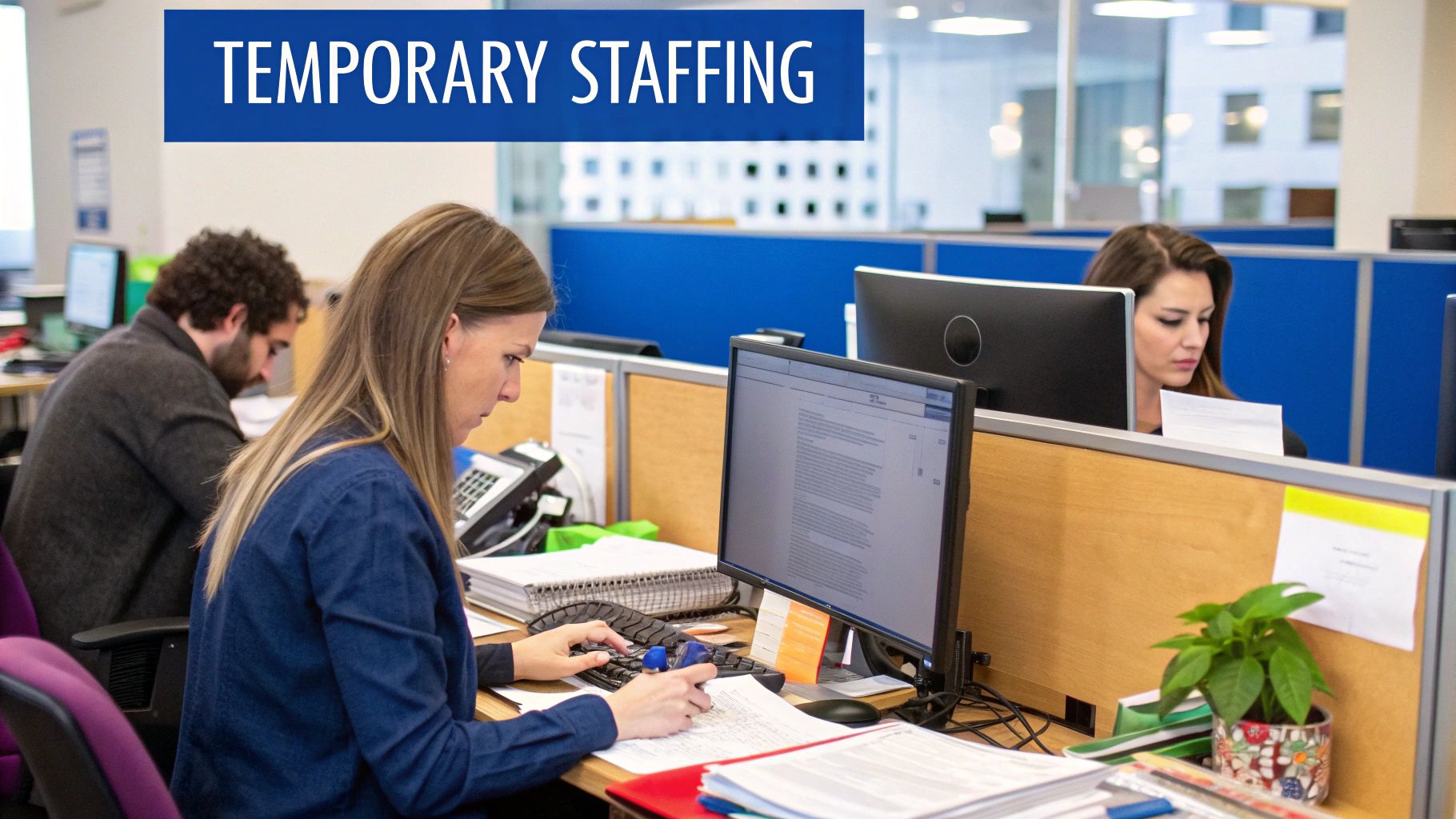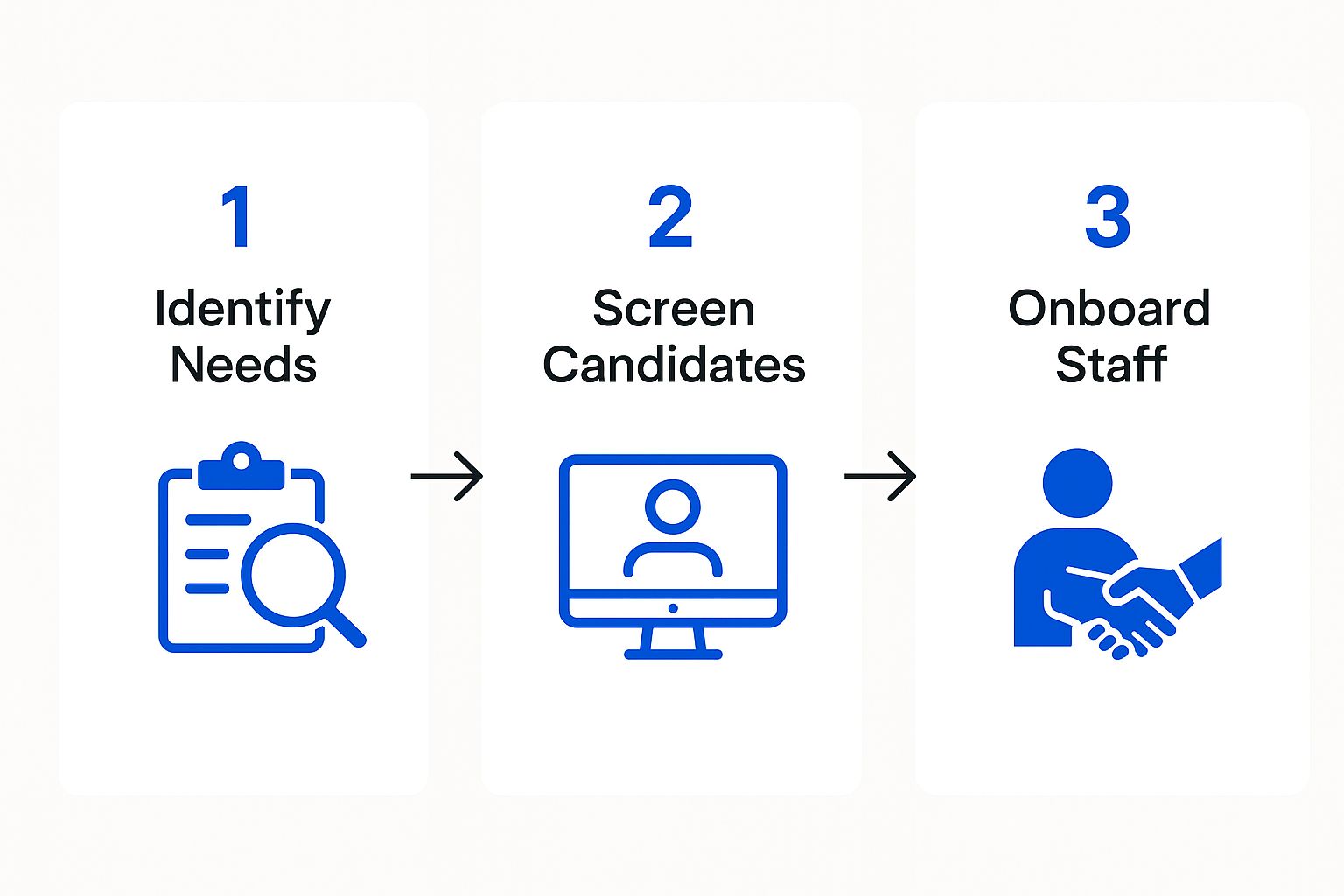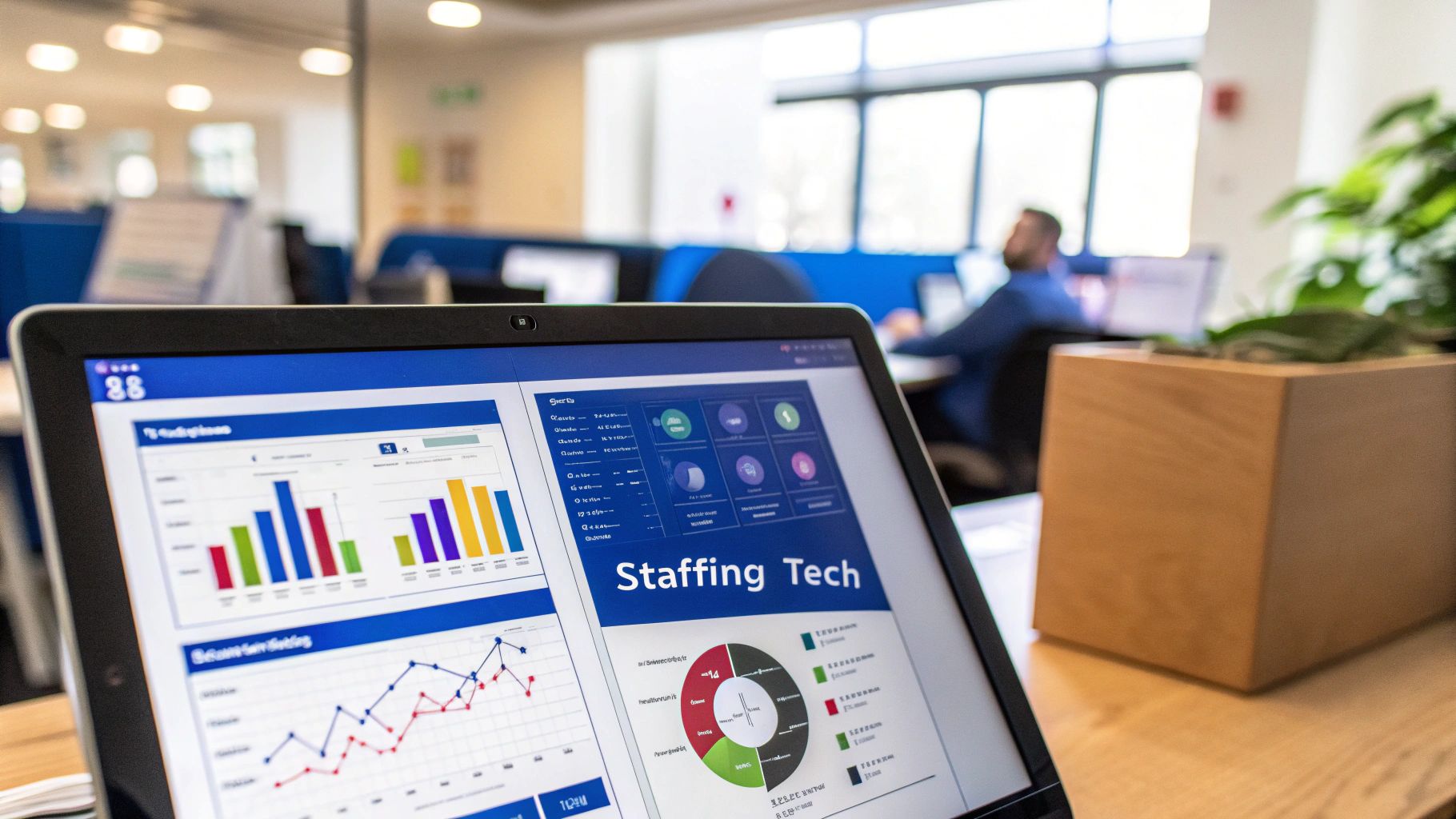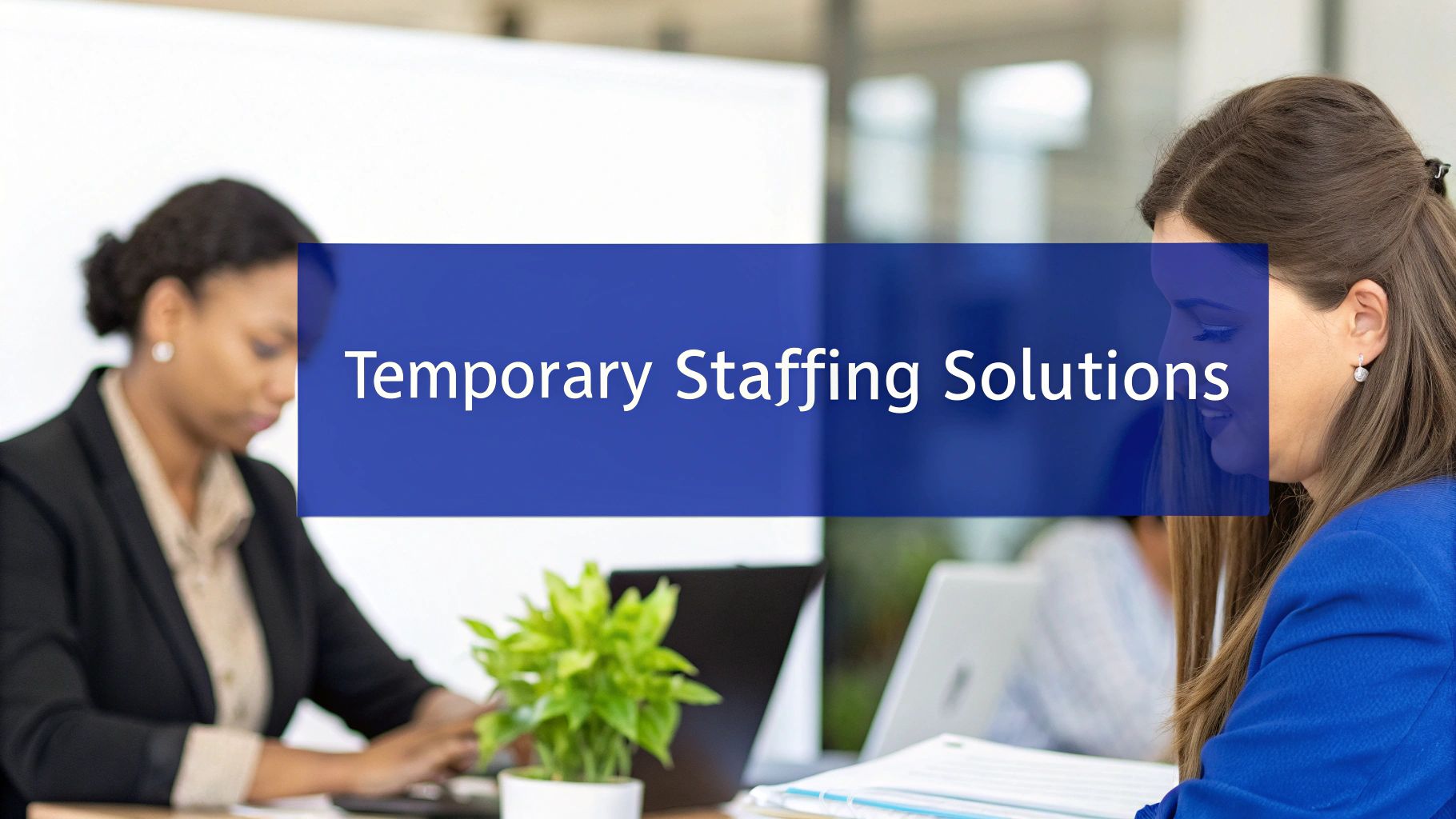Think of temporary staffing solutions as your business's secret weapon for agility. It’s like having a 'plug-and-play' workforce on standby, ready to bring in skilled professionals whenever you need them. Whether you're managing a sudden rush, covering for an absent team member, or tackling a one-off project, this approach gives you flexibility without the long-term ties of a permanent hire. It's this kind of strategic thinking that builds a truly resilient organisation.
What Are Temporary Staffing Solutions, Really?

At its heart, a temporary staffing solution is a service where an agency provides your company with workers for a set period. These agencies handle all the heavy lifting – they find the talent, vet them, and manage payroll and all the associated admin. This isn't just convenient; it frees up your internal teams to focus on what they do best, instead of getting bogged down in drawn-out hiring cycles.
But this model is much more than just filling an empty seat. It’s a powerful tool for smart workforce management.
Imagine your business gets a huge, unexpected spike in orders during your peak season. Instead of scrambling to hire permanent staff you might not need in a few months, you can bring in qualified temporary workers to scale up your operations almost overnight. And when things quieten down? You can scale back just as easily.
When to Bring in Temporary Staff
The reasons to use temporary staff are incredibly varied, offering a practical fix for many common business problems. From covering parental leave to bringing in highly specialised skills for a single project, it provides a direct answer to specific operational needs.
The key is to correctly identify the challenge you're facing and match it with the right kind of staffing solution. Technology is also playing a bigger role here, and it's worth understanding the different ways staffing and RPO agencies can use AI to source great candidates more effectively. For instance, if you need to fill a specific technical role, you might find that another approach is a better fit. You can dive deeper into this by reading about the pros and cons of outsourcing IT services in our guide.
The real power of temporary staffing lies in its adaptability. It allows a company to remain productive and competitive by precisely matching its workforce size and skills to its immediate operational demands, minimising waste and maximising output.
So, when does it make the most sense to use temporary staff? Here’s a table outlining a few common scenarios where this approach really shines.
When to Use Temporary Staffing Solutions
As you can see, temporary staffing is a versatile solution that helps businesses stay on course through all sorts of operational ups and downs.
Of course, here is the rewritten section with a more natural, human-expert tone, following all your specified requirements.
What Are the Real-World Benefits of a Flexible Workforce?
So, we've covered the basics. But what does using temporary staff actually do for your business? This isn't just about plugging gaps in the rota. Adopting a flexible workforce is a smart, strategic move that builds a more resilient and cost-effective company—one that can roll with the punches in today's unpredictable market.
Think of it like an accordion. A flexible team lets you expand your operations when things get busy and pull back when they quieten down, all without the dead weight of fixed hiring costs. That kind of agility is invaluable for handling everything from seasonal rushes to one-off projects.
Get Agile and Trim Your Overheads
The most obvious win is financial. Bringing on a permanent employee comes with a hefty price tag: recruitment fees, lengthy training, benefits, and long-term salary commitments. Temporary staffing neatly sidesteps a lot of that financial baggage.
With a temporary staffing model, a huge chunk of your fixed labour costs becomes a variable expense. This gives you laser-focused control over your budget, letting you match your spending directly to your current workload and income.
You’re paying for specific skills only when you need them. This frees up cash you can then push into other important areas—like new technology, marketing campaigns, or developing your next big product.
Tap Into Specialised Skills on Demand
What do you do when a crucial project lands on your desk, but your team doesn't have the niche skills to handle it? The traditional route of hiring someone could take months, putting your deadlines and reputation at risk. This is where temporary staffing agencies really shine, giving you instant access to a ready-made pool of vetted specialists.
Whether you need a data wizard for a six-month analysis or a certified engineer for a complex installation, an agency can have a qualified professional at your door, ready to hit the ground running. Having that kind of talent on tap gives you a serious competitive edge, allowing you to say "yes" to complex projects with complete confidence.
Reduce Hiring Risks and Keep Things Moving
Let's be honest, hiring is a gamble. A bad permanent hire can be a disaster, costing you not just money but also team morale and productivity. The "temp-to-perm" approach is a fantastic way to hedge your bets.
- Try Before You Buy: This model lets you see a candidate in action. You can properly assess their skills, attitude, and how they fit with your team before you offer them a permanent contract. It dramatically lowers the risk of making a hiring mistake.
- Maintain Momentum: When a key team member is off on sick leave or parental leave, temporary staff step in to ensure work doesn't grind to a halt. They keep productivity high and projects on track.
It’s clear that UK employers are fully on board. A report from mid-2023 showed that a massive 94% of businesses were planning to either keep or increase their use of temporary agency workers. That’s a huge vote of confidence, showing just how much companies rely on temporary staffing solutions to find the right skills and keep their operations stable. For more details, you can read the full temporary recruitment outlook on Staffing Industry Analysts.
Getting to Grips with the UK Temporary Staffing Market
Before you can really make the most of temporary staffing, it helps to understand the world you're stepping into. Far from being some new or unpredictable trend, the UK’s temporary staffing market is a huge, well-established part of our national economy. That’s great news for your business because it means there’s a steady, reliable supply of quality talent and experienced agencies who know the terrain inside and out.
Think of it like a bustling, well-organised marketplace. The stalls are set up, the sellers know their stuff, and you can be confident you’ll find what you need. This market is driven by a simple, powerful need: the need for businesses to stay agile. When the market shifts, companies have to react fast, and temporary staff give them the flexibility to scale up or down without taking on long-term financial risks.
The Sheer Scale and Recent Shifts
The size of this market alone tells you how important it is. In 2024, the UK's Temporary-Employment Placement Agencies market hit a value of roughly £56.1 billion. And it’s not slowing down, with forecasts pointing to £56.7 billion in 2025, a solid 1.0% increase. While there was a small dip in the average growth between 2020 and 2025, the recent upward trend shows just how resilient and vital this sector is.
This chart really puts the market's consistent growth into perspective.

The main takeaway here is dependability. A market this large doesn’t just swing wildly from one extreme to another. It provides a stable foundation you can build your workforce strategy on.
What’s Fuelling the Engine?
So, what keeps this demand so consistently high? It comes down to a few key business realities that make temporary staffing less of a stop-gap and more of a core strategy.
- Riding the Economic Waves: When the economic forecast is a bit foggy, businesses naturally lean towards flexibility. Temporary staff let you handle peaks and troughs in demand without the heavy financial commitment of permanent contracts.
- Finding Niche Experts: Sometimes a project needs a very specific skill, but you don't need that person on the payroll forever. The temporary market is a treasure trove of professionals with highly specialised skills, from complex IT rollouts to financial compliance.
- A 'Try Before You Buy' Approach: The classic 'temp-to-perm' route is a brilliant way to reduce the risk of a bad hire. You get to see how a candidate works, fits with the team, and performs in the role before you make any long-term promises.
When you start digging into the details, you’ll find that specialized staffing agencies play a massive role. These are the firms that live and breathe specific sectors, like finance or tech. They have deeper talent pools and a much better understanding of what you actually need.
The fact that the UK temporary staffing market is consistently valued in the tens of billions should give you immense confidence. It's a clear signal that bringing in temporary staff is not just a workable idea, but a smart, data-driven strategy for building a modern, resilient business.
The health of this market means that when you partner with an agency for your temporary staffing, you’re not taking a gamble. You’re plugging into a mature, efficient system designed to connect you with skilled, vetted professionals. It’s a dependable cornerstone of the UK’s flexible economy.
Your Roadmap to Implementing Temporary Staffing
Bringing temporary staff on board might feel like a big undertaking, but it’s actually a straightforward process when you break it down. The secret is to treat it like any other strategic project, not just a quick fix to fill a gap. Let’s walk through the key stages, from figuring out what you truly need to welcoming your new team member.
The first step is always the most important: getting crystal clear on what you need and why. It's easy to say, "we need an extra pair of hands for admin," but you have to go deeper. What exact tasks will this person own? Which software skills are non-negotiable? Crucially, how long do you anticipate needing their support? A precise job description and a firm timeline are your foundations for success.
This initial clarity does more than just help you; it prevents the role from expanding uncontrollably and ensures you’re getting the specific expertise you're paying for. When you hand a detailed brief to a staffing agency, they can pinpoint the perfect match, saving everyone from the headache of pointless interviews.
Define Your Needs and Find the Right Partner
With a clear picture of the role in mind, your next move is to choose the right staffing agency. Think of this as a partnership, not just a purchase. You want an agency that genuinely gets your industry, your company’s vibe, and the little details that make this role unique.
When you're shopping around for an agency, it pays to be thorough. Creating a simple checklist can help you compare potential partners and make a confident choice.
Agency Partner Evaluation Checklist
Taking the time to evaluate these points helps ensure you don't just find a candidate, but the right candidate for the job.
This infographic lays out the core workflow beautifully, from that initial needs assessment all the way to getting your new hire started.

As you can see, a structured approach is what separates a good temporary placement from a great one.
Onboard for Maximum Impact
Finally, let's talk about onboarding. This is your chance to set your temporary worker up for a flying start. Even the most talented professional needs a proper welcome and introduction to your team's way of working. A planned onboarding process is what helps them hit the ground running and start adding value from day one.
One of the most common mistakes businesses make is skipping a formal induction for temporary staff. A brief but thorough onboarding—covering key contacts, system access, and immediate goals—is absolutely essential for productivity and smooth integration.
Getting the onboarding right is a key part of the puzzle, especially if your team is spread out. For more in-depth ideas on this, our guide on successful remote hiring strategies has some excellent, practical advice.
By following these simple steps, you can turn temporary staffing from a reactive panic into a proactive, strategic advantage for your business.
Navigating Costs and Contracts Like a Pro
Let's talk about the brass tacks: the money and the paperwork. Getting your head around the costs and contracts for temporary staffing solutions isn't just about dodging hidden fees. It’s about truly understanding the value you get when you work with a great agency.
That mark-up you see on an agency’s rate? It’s not just profit. It’s the engine that runs the entire operation, covering a mountain of admin and risk. This includes everything from finding and vetting candidates to managing payroll, PAYE tax, National Insurance contributions, and statutory holiday pay. In short, the agency acts as the employer of record, taking a massive compliance headache off your plate.
Unpacking the True Costs
It's a common mistake to compare a temporary worker's hourly rate directly against a permanent employee's salary. That's like comparing apples and oranges because it misses the full story of what a permanent hire actually costs your business.
A permanent employee’s "fully-loaded" cost goes way beyond their salary. You have to factor in employer National Insurance, pension contributions, benefits, recruitment agency fees, and the time and resources spent on onboarding. When you put that all-in figure next to the straightforward rate for a temp, the financial sense of a flexible workforce often becomes blindingly obvious.
This approach effectively turns a fixed, hefty overhead into a manageable, variable expense that scales precisely with your workload.
Key Contract Clauses to Understand
A solid contract is your best friend—it protects you, the agency, and the worker. Before you sign on the dotted line, pay special attention to a few key clauses. Getting these right from the start gives you complete peace of mind.
- Temp-to-Perm Conversion Fees: What happens if you love a temp and want to hire them permanently? This clause lays out the process. It's a standard part of most agreements, compensating the agency fairly for their initial hard work in finding you that perfect person.
- Notice Periods: Always check the notice required to end an assignment. This ensures everyone can plan accordingly and the transition is handled professionally, without burning any bridges.
- Liability and Insurance: The contract should spell out exactly who is responsible for what. This is especially important for things like professional indemnity and public liability insurance.
As you explore different temp arrangements, it’s also wise to familiarise yourself with the finer points of employment law, including things like the specifics of zero-hour contract holiday pay. Knowing the landscape helps you move forward with confidence.
So, Why Choose Beyond Hire?

Choosing a partner for your temporary staffing solutions goes deeper than just filling a seat. It's about finding an agency that actually gets what makes your business tick. At Beyond Hire, we don’t just operate on a transactional basis. We start by acting as your consultant, taking the time to properly understand your specific operational hurdles and company culture before we even glance at a candidate's CV.
This deep-dive approach means we look beyond a simple skills match. We connect you with professionals who not only have the technical chops but also fit right into your team's way of working, ready to contribute from their very first day. We're committed to delivering value you can see and feel—not just another name on a timesheet.
A Process Built on Precision and Care
Our real value lies in a careful, multi-layered process that’s built for both quality and speed. We’re firm believers that finding the right temporary professional takes more than a keyword search in a database. It needs a human touch, backed up by smart technology.
We don't just fill roles; we solve business problems. By focusing on deep industry specialisation and a rigorous vetting process, we ensure every candidate we present is not only skilled but also motivated and prepared to integrate seamlessly into your team.
This dedication to quality is more important than ever. The UK workforce is becoming increasingly flexible, with the number of temporary workers recently seeing a 9.8% year-over-year increase, now standing at around 1.60 million people. This shift makes it vital to have a reliable partner who can skilfully navigate this expanding talent pool. You can learn more about the UK temporary workforce growth on Staffing Industry Analysts.
The Beyond Hire Difference
What really sets us apart is our dual commitment. We are laser-focused on our clients' needs, but we're equally dedicated to our candidates. This approach creates a better experience for everyone involved.
Here’s a snapshot of what that looks like in practice:
- Rigorous Vetting: We go beyond the CV, assessing candidates for technical skills, communication style, and how well they align with your company’s values.
- Tech-Driven Precision: We use technology to speed up the matching process, but never at the expense of getting it right.
- Unwavering Compliance: We take care of the tricky bits—like payroll and employment regulations—so you don't have to worry.
- Dedicated Candidate Care: We believe well-supported professionals are motivated professionals. Our focus on the candidate experience means you get a higher calibre of engaged talent.
By bringing all these elements together, Beyond Hire provides temporary staffing that adds genuine, lasting value to your organisation.
Your Top Questions About Temporary Staffing Answered
Even when you see the clear advantages, it's completely normal to have a few lingering questions about bringing temporary staff on board. Let's walk through some of the most common queries we hear from clients to help you get a clearer picture.
How Quickly Can We Actually Fill a Role?
This is where working with a staffing agency really shines. For many standard administrative or operational roles, we can often have a pre-vetted, qualified candidate ready to start in as little as 24 to 48 hours.
Of course, a highly specialised or senior role might take a bit longer. But even then, an agency like Beyond Hire taps into its extensive talent pool to slash the time it would take you to find someone through a traditional, drawn-out recruitment process.
The real magic here is about minimising disruption. Instead of a project grinding to a halt for weeks while you search for a replacement, you can plug that gap almost instantly and keep everything moving forward.
Who Is Legally the Employer?
This is a critical point and a huge part of the value an agency provides. Simply put, the staffing agency is the employer of record.
This means we handle all the tricky legal and administrative responsibilities that come with employment. This includes:
- Managing all PAYE tax and National Insurance contributions.
- Calculating and paying out holiday entitlement.
- Ensuring compliance with pension auto-enrolment.
As our client, your main job is to provide a safe place to work and manage the temp's day-to-day tasks – just like you would with any other member of your team. This clear division of labour lifts a massive compliance weight off your shoulders.
What If a Temp Is a Perfect Fit and We Want to Hire Them?
It happens all the time, and frankly, it's a great outcome! When a temporary worker integrates so well that you want to offer them a permanent contract, you're looking at a "temp-to-perm" arrangement. It's a fantastic, low-risk way to recruit.
Agency agreements are built for this. Usually, once the worker has completed an agreed-upon number of hours with you, you can hire them directly by paying a one-off conversion fee. This fee is simply fair compensation for the agency's initial work in finding and vetting such a great candidate for you. Thinking about temp-to-perm options can be one of your most powerful employee retention strategies, as it lets you be absolutely certain of the fit before making a long-term commitment.

